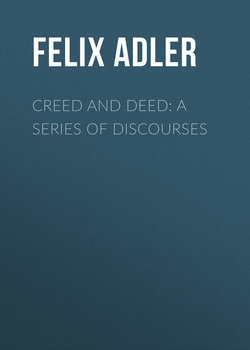Creed and Deed: A Series of Discourses

Реклама. ООО «ЛитРес», ИНН: 7719571260.
Оглавление
Felix Adler. Creed and Deed: A Series of Discourses
PREFATORY NOTICE
CREED AND DEED
I. IMMORTALITY
II. RELIGION
III. THE NEW IDEAL
IV. THE PRIESTS OF THE IDEAL
V. THE FORM OF THE NEW IDEAL. A NEW ORDER
VI. THE RELIGIOUS CONSERVATISM OF WOMEN
VII. OUR CONSOLATIONS
VIII. SPINOZA
IX. THE FOUNDER OF CHRISTIANITY
X. THE FIRST ANNIVERSARY DISCOURSE
APPENDIX
I. THE EVOLUTION OF HEBREW RELIGION
II. REFORMED JUDAISM
III. REFORMED JUDAISM
Отрывок из книги
The Spciety which I have the privilege of addressing, has been organized with the above for its motto. Some of my hearers have entirely abandoned the tenets of the positive religions; others continue to hold them true, but, are discouraged by the lack of spiritual force, the prominence given to mere externals, the barren formalism in the churches and synagogues. We agree in believing that theology is flourishing at the expense of religion. It seems to us that differences in creed are constantly increasing, and will continue to multiply with the growth and differentiation of the human intellect. We perceive that every attempt to settle problems of faith has thus far signally failed, nor can we hope for better results in the future. Certainty even with regard to the essential dogmas appears to us impossible. We do not therefore deny dogma, but prefer to remit it to the sphere of individual conviction with which public associations should have no concern. Far from believing that the doctrines of religion as commonly taught are essential to the well being of society, we apprehend that the disputes concerning the "author of the law" have diverted the attention of men from the law itself, and that the so-called duties toward God too often interfere with the proper performance of our duties toward one another. It were better to insist less upon a right belief, and more upou right action.
In order to find a common basis whereon good men, whether believers or unbelievers can unite, we look to the moral law itself, whose certainty rests in the universal experience of civilized Humanity. We shall hold questions of faith in abeyance, shall endeavor to stimulate the conscience and to this end shall seek to awaken an interest in the grave social problems of our day, which need nothing so much as a vigorous exertion of our moral energies, in order to arrive at a peaceable solution. To broaden and deepen the ethical sentiment in ourselves, and to hold up to the sad realities of the times, the mirror of the ideal life, is the object with which we set out. We do not therefore delude ourselves with the hope that the ideal will ever be fully realized, but are convinced that in aspiring to noble ends the soul will take on something of the grandeur of what it truly admires. Starting with the assumption that the doctrines of religion are incapable of proof, it behooves us to show in one or more instances the fallacy of the arguments upon which they are commonly founded, and we shall begin with the doctrine of IMMORTALITY.
.....
Furthermore, it follows from what we have said that the belief in immortality should not be inculcated as a dogma in our schools of religion, and above all that the dictates of the moral law should in no wise be made to depend upon it for their sanction. The moral law is the common ground upon which all religious and in fact all true men may meet. It is the one basis of union that remains to us amid the clashing antagonisms of the sects. While dogma is by its nature, open to attack, and its acceptance at all times a matter of choice, the principles of morality have a right to demand implicit obedience, and should rest as everlasting verities in the human heart. Let us reflect well before we imperil the latter by the undue prominence which we give the former. It is not needful to impart to a child the whole truth, but what it learns should be wholly true, and nothing should be taught it as a fundamental fact which it can ever in after years be led to call in question. How often has it occurred that when the riper reason of the man has rejected the tenets of the church in which he was educated, he has been tempted to cast aside all the religious teachings of his youth, the moral with the rest, as idle fable and deceit.
And lastly, friends, as we do not, cannot know, it is presumably wise that we should not know. The vanity of all our efforts to grasp the infinite, should teach us that on this island of time whereon we live, lies our work. In its joys we may freely take delight; for its woes we should reserve our sympathies, and in laboring to advance the progress of the good we must find our satisfaction.
.....